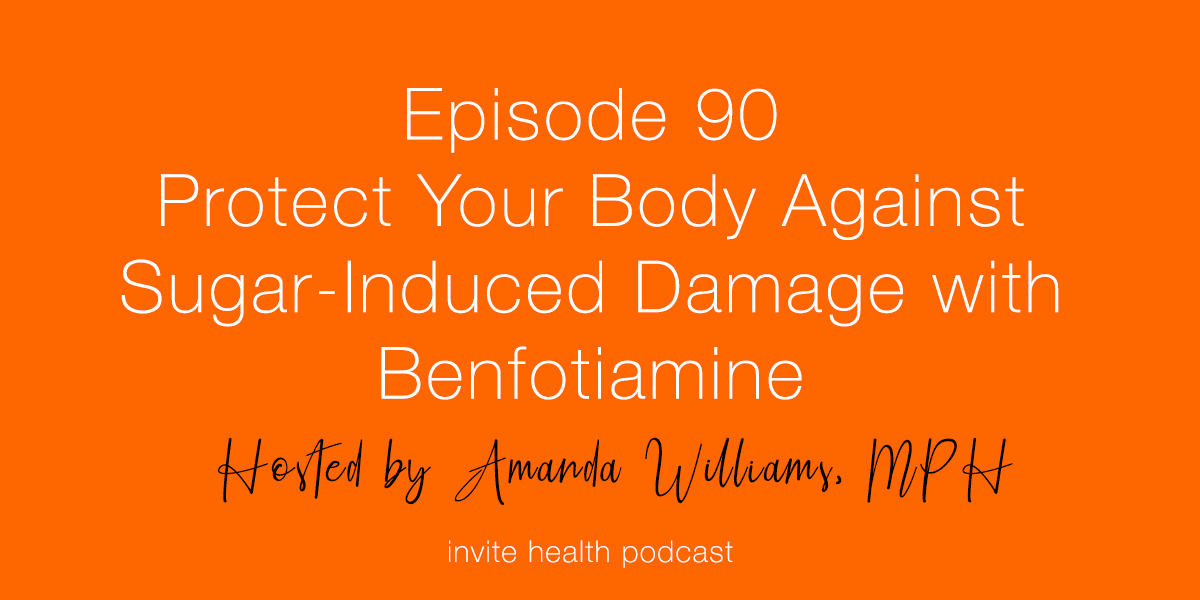Protect Your Body Against Sugar-Induced Damage with Benfotiamine – Invite Health Podcast, Episode 90

Invite Health Podcast, Episode hosted by Amanda Williams, MPH
Subscribe Today!
Let’s talk about the harmful effects of glycation – what it is, how is it impacting our health, why it may be hard to understand and the role it plays in your body. We will discuss what you can do to fend off excessive glycation in our system, including an important form of Vitamin B1 called Benfotiamine.
What is Glycation and What are AGEs?
Our bodies go through something called the Maillard Reaction. This is the result of a chemical reaction between amino acids and sugars. An example of a maillard reaction is when you are cooking and browning foods. The sugar creates that charring effect on our foods at higher heat, like on a grill. This reaction was named after a french chemist – Louis Camille Mallard. It was first described back in the early 1900s, when researchers were trying to recognize the impact of high temperature.
This same chemical change occurs inside of our body. Within every cell, the sugar that the body uses for fuel is busy doing different things. When you have this byproduct of this chemical reaction, you end up with Advanced Glycation End Products (AGEs). AGEs can be extremely detrimental to the human body. Excess glucose from sugary foods and drinks create these AGEs, damaging many things including your bodies DNA.
How Grape Seed Extract Has Been Shown to Benefit People with Diabetes. Listen Now! >>
AGEs are directly correlated to oxidative stress and inflammation and they can really harm the function of nerve cells. This is why Diabetic Neuropathy or Diabetic Retinopathy happens in your body – because of excess circulating glucose. This is why the hemaglobin A1C test is so important. AGEs can also deactivate enzymes.
Protecting Your Body Against AGEs with Benfotiamine
The body has its own natural defenses to protect itself against this glycation. One of the most powerful, natural defenses against AGEs happens to be Vitamin B1 (Thiamine). Now, the major issue when dealing with water soluble vitamins is, are we going to have enough or is there going to be a limited supply? If glucose in your system is too high, it is depleting all of that Thiamine and a build up of AGEs occurs.
So, researchers set out to investigate the benefit of fat soluble Vitamin B1. This is something that could stay in the system longer in order to offset and combat this build up of glucose. They found this really unique form of Thiamine called Benfotiamine, a fat soluble Vitamin B1. According to research and testing, using Benfotiamine allows for a 40% higher Thiamine amount that can be incorporated into your heart, liver, brain and muscles to allow for better protection from glycation. Benfotiamine has been shown to block sugar-induced damage in the body. It activates this powerful enzyme called Transketolase, which plays a role in converting toxic glucose-induced metabolites into these harmless compounds. Without it, you will have more AGE build up that causes significant damage within our system.
Benfotiamine has also been shown to ease inflammation by inhibiting the activation of something known as NF Kappa beta, or Nuclear factor kappa beta. This is a trigger for extremely dangerous inflammatory reactions in the human body. So if Benfotiamine can down regulate that and impede the body’s ability to activate NF Kappa beta, then we are able to regulate a more proper inflammatory response.
Recent studies have shown that Benfotiamine can be very beneficial for memory. Researchers found that this fat soluble Vitamin B1 was disrupting the production of amyloid plaques as well as touL proteins in the brain. Right now, Columbia University is studying Benfotiamine for mild cognitive impairment and Alzheimer’s. I am very interested to see this outcome!
Krill oil and Fish oil have been shown to further support brain health. Listen now >>
Thank you for tuning in to the Invite Health Podcast. You can find all of our episodes for free wherever you listen to podcasts or by visiting www.invitehealth.com/podcast. Make sure you subscribe and leave us a review! Follow us on Facebook, Twitter and Instagram at Invite Health today. We’ll see you next time on another episode of the Invite Health Podcast.

